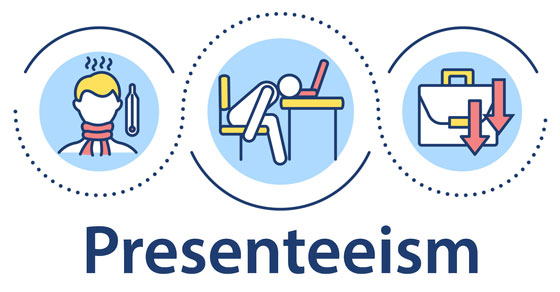
Stay on the Lookout for Presenteeism
Employers have been advised for years to beware of “presenteeism” and its often slow-developing negative effects on an organization. Obviously, a regularly absent employee isn’t getting much work done. But someone who repeatedly shows up unwell — the definition of presenteeism — tends to accomplish less, produce substandard work and might even hurt the performance of co-workers.
An employee who works in an office or other facility and comes in physically ill could literally sicken other staff members. This has become a particularly acute problem during the COVID-19 pandemic. But presenteeism can be more subtle and hard to spot when it involves mental illness, major stress or burnout. These issues can develop slowly and be hard to detect until they become major problems.
Promote your benefits
“We offer paid time off for illness” is a common response to presenteeism. Paid sick days do generally help resolve incidences of physical ailment or injury. However, they often fail to adequately address struggles with mental illness, burnout, and stressors such as divorce or financial struggles. Some supervisors might raise an eyebrow at those taking a “mental health day,” so sufferers end up coming in to work when they really need a day off.
How can you help? If you sponsor a health care plan, it likely offers coverage for mental health and substance use disorder services, including behavioral health treatment. Be sure employees are aware of this.
Also, reinforce with staff that you’ll honor the sick-day provisions spelled out in your employee manual for all types of ailments (physical, mental and psychological). Train supervisors to support employees’ well-being, which includes encouraging team members to take time off when necessary.
Encourage healthy work habits
Another common cause of presenteeism is the perceived notion that workers must put in excessive overtime to prove themselves. Some organizations still operate under an “old school” culture that says working extra shifts or even 24/7 when salaried will make the boss happy and lead to quicker raises and promotions.
Many supervisors assume that an absent employee automatically means productivity is plummeting. Conversely, if someone is always “burning the midnight oil” and skipping vacations, productivity must be soaring. But these assumptions aren’t always true — they must be supported by a thorough, objective and analytical performance evaluation process.
You can prevent this cause of presenteeism by strongly encouraging, if not strictly enforcing, paid time off. Communicate to employees your concerns about overworking and remind them to take advantage of the time off that they’ve earned. (Doing so can also deter fraud.)
Don’t forget telecommuters
Many of today’s employers face an even bigger challenge spotting and addressing presenteeism because so many people work from home, where showing up (logging in) unwell is incredibly easy. Be sure to train supervisors to check in regularly with telecommuters and watch for signs of burnout. We can help you track and analyze data points related to productivity that may raise a red flag of presenteeism in progress.
© 2022